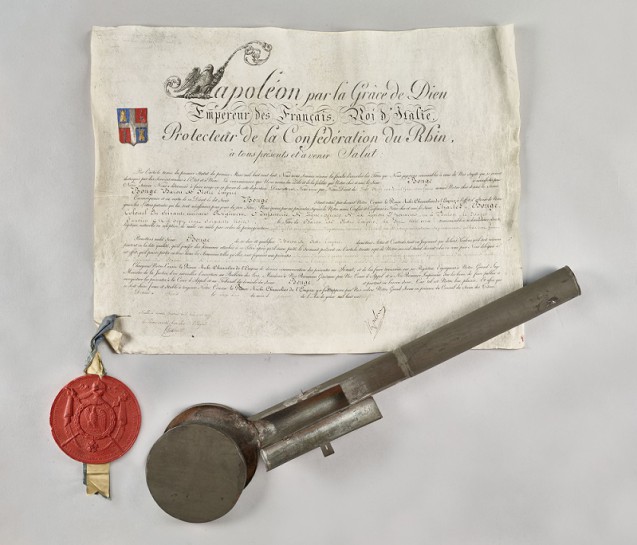This “Baron d’Empire” diploma was granted to Colonel Charles Bouge at the end of March 1808 and confirmed in January 1809. He was in the first wave of Barons d’Empire, the title having been created on 1 March 1808.
Charles Bouge embraced the French Revolution: he was captain in the 2nd Battalion of Volunteers of the Var on 17 September 1791, continuing his military career in the Armée des Alpes and the Armée d’Italie until 1796, and then in Helvétie and in the Armée du Rhin from 1799 to 1800. In 1804, he was promoted to Chef de bataillon of the 32nd Line Infantry Regiment and fought in the German Campaign of 1805, getting wounded in the left arm before Austerlitz. He took part in the campaigns of the following two years, becoming Colonel of the 61st Line regiment in 1807 aged 44. He received a ‘dotation’ of 4,000 francs funded from land in Westphalia in March 1808 and was made “Baron d’Empire” by letters patent dated 29 March and 28 January 1809. He took part in the Russian Campaign of 1812, the year which began well when he became Commander of the Légion d’honneur, but which finished badly when he was captured by the Russians on 10 December. Returning to France in August 1814, he re-assumed command of his regiment during the Restoration, and he was to be made Chevalier in the Ordre de Saint Louis. Keeping his position during the Hundred Days, he was made ‘non active’ six months after Waterloo in November 1815. Charles Bouge retired ten years later, and died at Callian in the Var on 25 May, 1826.
This career perfectly illustrates why the Imperial ‘nobility’ was created. Just like the Légion d’honneur, made so as to provide official recognition for military or civil excellence, the ‘noble’ title was supposed to reward fidelity to Napoleon I. It also included however a desire to raise the recipient and their family both socially and financially (via a majorat), though the recipient had already to be wealthy. For the rank of Baron, for example, recipients had to prove income higher than 15,000 francs per year. When the Baronage was a political reward, only the mayors of large towns and bishops would receive the title automatically.
Oddly enough, the term “nobility” appears nowhere in any of the March 1808 founding statutes that created the titles of “Comte” [Count], Baron, and “Chevalier” [Knight]. This would seem to set it apart from the explicitly imperial nobility created in 1804 with the first Princes of the Imperial Family (the rank of Duc [Duke] being created in 1806). Even more oddly, even though Napoleon I wanted to set his aristocracy apart from that of the Ancien Regime and create a new noble elite, he nevertheless gave the different ranks of his ‘nobility’ the same titles. The management of the new social system was attributed to the Conseil du sceau [Privy Seal Council] led by Cambacérès, Portalis and Pasquier.
As with every aspect of his new empire, Napoleon was attentive to all the details, even including the heraldic symbols used on the new coats of arms. He decided, for example, that apart from rare exceptions (inter alia Murat and Talleyrand), crowns were not permitted on the new escutcheons. For Comtes and Barons, their heraldry was naturally closely linked to the job or status of the recipients. Furthermore, widowed Countesses of military men often had inverted swords on their coat of arms, and these were often sable in colour for mourning (see here for a description (in French) of all the coats of arms).
When receiving a title and a ‘majorat’, the recipient had to swear an oath in the month following the award, either directly to the Emperor himself for Princes and Ducs, or to a person designated by the Emperor for the other titles. The oath ran as follows: “I swear to be faithful to the Emperor and his dynasty, to obey the constitution, laws and rules of the Empire; to serve His Majesty as a good, loyal and faithful subject; to raise my children in the same spirit of fidelity and obedience, and to march to the defence of the Fatherland every time the territory is threatened or that His Majesty goes to the army”.
The Imperial ‘nobility’ suffered different fates after the fall of Napoleon. though they kept their titles, most of them lost their ‘majorats’, especially if the territorial security for the funds was outside France, as was the case for the ‘dotation’ of Colonel Bouge. His tomb lies in Callian in the vault – still visible – of the family of his mother, née Mireur.


